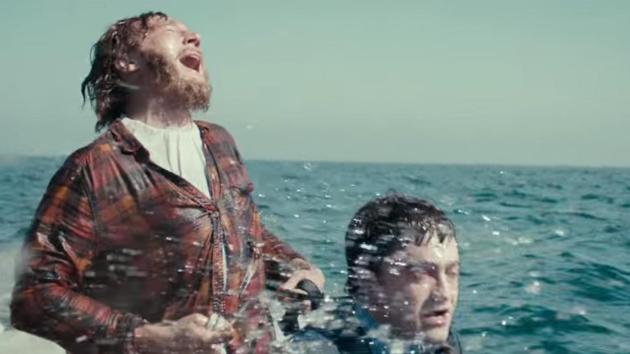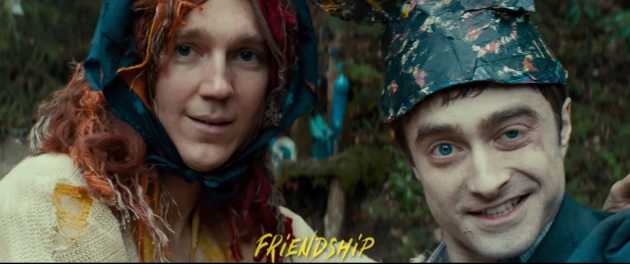
What a way to describe a film. The “farting corpse movie.” As if it were a loaded genre or something. If you read any coverage regarding Swiss Army Man—directing duo Daniels properly announcing their singular, exciting voice in American cinema, Daniel Radcliffe finalizing his evolution from Harry Potter into one of our best young actors, Paul Dano pushing his vulnerable outsider archetype farther than ever before, Sundance’s divisive reception of the film, that beautiful score—you will read that phrase. The “farting corpse movie.” One article went even farther, calling it the “farting boner corpse movie.” None of these descriptions are wrong.
What do you think when you read that? It excites me, but I’m strange. Before watching a different film, the Swiss Army Man trailer played, and I sort of shared this moment with a worker at the theater. I was running late (usual) and he needed to check my ticket. “That movie—I can’t wait to see it,” he admitted, like he was sharing a guarded secret. “Oh, me too,” I said, perhaps a bit eagerly. He paused, administering a strange look, then walked away, probably to do his job.
It’s weird. Even now I’m finding it difficult to outright say I fucking love this film. In conversation, trying to convince others to see Swiss Army Man, I preface my enthusiasm with all these qualifiers: “You need to know, it’s a strange journey…” “Do you think farts are funny? You need to. Farts can be so beautiful, too…” (this was a failed pitch, obviously) “I can admit: it’s probably not for everyone but…” “It’s known as the ‘farting corpse movie,’ which is a loaded description because…”
No qualifiers: Swiss Army Man regards a hopeless loner teaching a farting corpse what it mean to be alive. When the film opens, we learn this man, Hank is his name, is trapped on a deserted island and given up hope he’ll ever be rescued. So he decides to hang himself. His first attempt fails, the rope snapping, but during his second go, he spots a figure washed ashore. Maybe a rescuer, or a friend, someone who can help. But Hank discovers the figure is a dead man, a corpse, and loses hope once again. He attempts to kill himself once more, but can’t prepare himself to commit because this corpse keeps farting. It’s a scene so dark and perverse, yet deadly hilarious. I couldn’t stop laughing that a suicide attempt failed and failed and failed because of a dead guy’s slapping flaps. The film confronts your own self-image throughout in this subverted way: Will you let yourself laugh? Are you willing to submit yourself down this fart-fueled rabbit hole? Because there will be absolutely no hand-holding on this ride. Deal with it.
And what’s more: they follow that kind of sardonic, childish humor with the most gorgeous and cinematic shot I’ve seen in movies this year. Hank approaches the corpse, now washing in the waves, and realizes he can ride this farting corpse like a jet ski and escape this wretched island (“fart-fueled” is a very purposeful adjective). He does, the camera cutting wide, water splashing every which way, the ocean shimmering with it serene blues and whites, these two filthy bodies riding into the sunset.

Oh how often we escape one prison to find ourselves trapped again. Hank and Manny, the aptly-named corpse, wash up on another shore and must find their way back to civilization. As Hank confides more and more in Manny, the corpse becomes alive. He can collect precious rain water in his gullet. Thanks to set-in rigor mortis, a snap of his fingers produces a spark to light campfires. Projectiles launch from his mouth to hunt food and access out-of-reach places. Manny can do anything. “A multi-purpose tool guy.” A Swiss Army Man.
But realizing one’s potential only qualifies but a fraction of life’s meaning. Because when Manny discovers a photo of a beautiful girl in Hank’s phone, he learns about love. Now here’s where the movie ruptures itself open; inside this screwball buddy comedy, lies a sensitive soul desperately wishing to connect with you.
Most cinema, most stories, are illusions. Sitting in a dark movie theater with other people, or home alone on your couch, it’s easy most times to give yourself over. To exist inside the greedy violence and backstabbing paranoia of The Godfather, or the postmodern and campy ADHD of anything Tarantino makes, or even the saccharine drippings and feel-good reassurances of a Nancy Meyers flick. You might have your issues, but it’s not too difficult to jump aboard.
Those directors, and the large majority of films in general, ground their worlds in the objective world we all live in. The gangsters of Goodfellas live by a code, a giant shark terrorizes our waters in Jaws, the chaotic war zones of the Hurt Locker and Zero Dark Thirty all exist as possibilities in our world, some more so than others. The experiences may be heightened, tripped-out, and unlike anything we’ll ever personally see, but we recognize it as real.
Directing duo Daniels have zero interest in pretending. They’ve worked mostly as music video and short film directors and you’re likely familiar with their most famous work, the music video for DJ Snake and Lil John’s “Turn Down for What.” My face melted the first time I watched it. It’s so absurd: The beat causes listeners to lose control of their bodies, and as a result, they literally bring the house down. Dicks and giant knockers bounce to the beat. And it makes sense within context: That song does sort of make you go wild. If you’re at a club or rave or whatever, try not to dance, try and fight the feeling. You will lose or you will die from the crazies around you.
Daniels really like literalizing how experiences and emotions feel, as they did with the very-NSFW Joywave’s “Tongues.” Trying to describe what they do in the short-form generally either spoils or dilutes their work. With this video, you end up with some slightly patronizing derivative like the “hippie-hunter Romeo & Juliet music video.” Sure, it works. But goodness it’s so limiting to discuss art on this level.
https://vimeo.com/98653191
Now, they’re not the first directors to work in that surreal/metaphorical space. Daniels is descendants of the Spike Jonze-Michel Gondry-Charlie Kaufman triumvirate. Projects like Her, Eternal Sunshine of the Spotless Mind, and Synecdoche, New York take place in alternate realities similar to our own with dreamlike logic and technologies. And on some level, we’re experienced with so-called grounded and realistic movies pushing metaphor and analogy on us to create meaning within a narrative. It’s no coincidence Spike Lee’s Do the Right Thing happens on the “hottest day of summer” or Andy Dufresne must escape prison and crawl through “300 yards of shit” for his true freedom in Shawshank Redemption. We understand what that points toward within those stories.
So I’ll ask: What does it mean that a guy who ran away from home and wanted to kill himself must teach a dead corpse how to live and love and be happy and in the process learns those things for himself? Because what happens over the course of the film, as Hank tries to teach those Big Ideas About Life, like a parent instructing their child, is that we realize how much Hank closes himself off from the world. There’s a great moment, featured in the film’s trailer, where so no real spoilers Manny says in that deductive way children can, “You want to go home so you can have love but you ran away because nobody loves you.”
Many have felt that way—that nobody loves us—at one point in time: after a breakup, a death in the family, leaving home for the first time. And when Hank responds to Manny, teaching him proper decorum—“You can’t just say anything that comes into your head, that’s bad talking”—you start to recognize the barriers we impose on ourselves as humans. We limit our potential. The dead guy can do anything, he begins walking on his own and thinking for himself. He’s a swiss army man. But what about all of us who are alive?
It’s around this point the film dares you to consider how much the farts really matter. And you do start to wonder. Why do we treat farts like it’s the worst part of ourselves? Why do we hide such a universal experience, a bodily function we hold no control over, one that can be so goddamn funny, from the people we love most: a girlfriend, a dad, a grandmother? Trust me, I accept how fucking crazy that reads. Like, come on, it’s just a fart, dude. Not that important. Normally, I’m apt to agree, but the sorcery of this movie is that it doesn’t sound crazy after watching it. When Daniels first pitched this movie to Paul Dano, they said, We want to make a movie where the first fart makes you laugh and the last one makes you cry. Dano was in from there (I would’ve been too), and if you buy in all the way, you’re probably granting the filmmakers that wish.
The film throws these inversions and ideas at you constantly. You can’t believe some of these thoughts usually held private within your own mind are being said out loud and on screen. They’re just too, well, weird. But removed from the whims of society, and the burden of respecting others, Hank’s able to admit these things through Manny. And he realizes something we all say but never fulfill: Only you decide the definition of your life.
To teach him, Hank performs that concept for Manny: He analyzes his own life, lays bare his insecurities, and tells his captive audience stories, which are tools to demonstrate what it means to be human. Could there be a more fitting description of art is to its audience?

The illusion ends when a movie ends. The spell breaks and we must return to society and join the rest of humanity, who didn’t see what we saw, doesn’t maybe understand the possibilities out there. So too is the case for Hank and Manny when they leave their forest. A worry envelops that maybe Hank went a little insane, possibly he’s a schizophrenic. His growth remains evident, he’s now steadfast in his beliefs, but he has to answer to the normalcy of the world. The movie doesn’t cheapen its narrative by only providing the triumph of epiphany. The rest of the world doesn’t forgive your failures and mistakes just because you suddenly love your farts. But the film’s final shot knows it matters for something, even just to yourself.
Who knows why I’m so obsessed about the fart thing. That’s what this movie’s done to me. I kind of laugh every time I read or hear Swiss Army Man described as the “farting corpse movie.” Because no doubt, that’s what the movie is. Sort of proudly so, too. But you leave unsure of who was the real farting corpse: Was it Manny? Or was it Hank? Or was it perhaps the rest of us, sleepwalking through life, ashamed of everything about ourselves, including our farts, until the day we die?
(And…..cue the whoopee cushion!)
Don’t you see? Farts are just funny.




